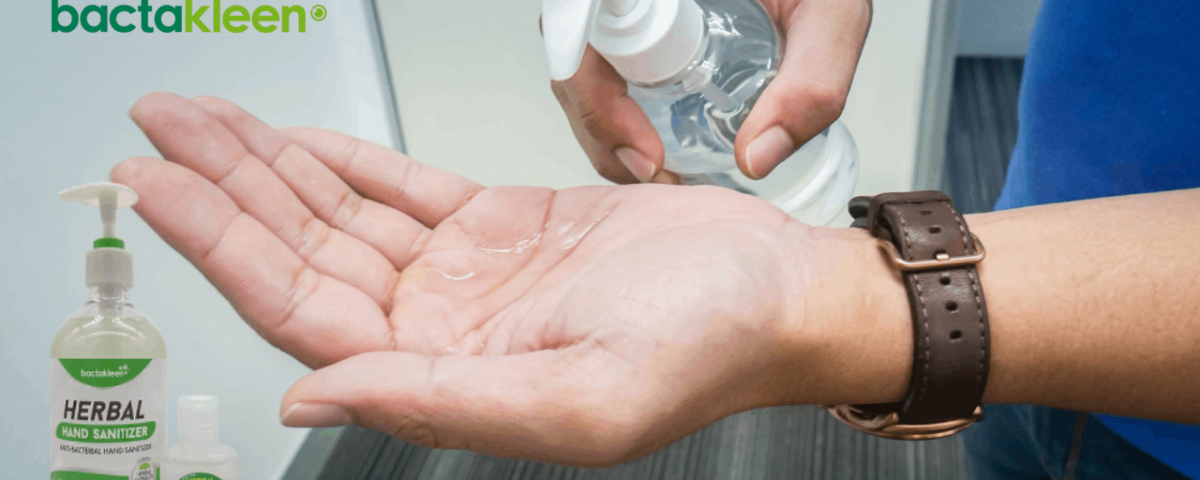- World's No.1 selling Anti Bacterial Treatment System!
- +971 56 3304466
- +971 55 9676070
- info@bactakleen.ae
What Makes a Sanitizer Effective?

Can You Travel with a Multi-Purpose Disinfectant Spray?
December 4, 2020
What Alcohol is Best for Disinfection?
December 17, 2020What is a sanitizer?
The CDC recommends the washing of your hands to be among the best ways of preventing infections. But when water and soap are unavailable, health professionals believe that alcohol-based hand sanitizers are the next best alternative. However, it is not clear how effective sprays and gels can remove dangerous germs? Here are some of the things you should know about a sanitizer.
Hand sanitizers kill germs
Before digging deeper to understand what makes a sanitizer effective, I think it would be best to understand what it is. According to Arbogast t al.‘s studies, 1 out of 5 people never wash hands regularly. Of the ones who keep up with the practice, 70percent do not use soap. However, providing hand sanitizers in the most used areas (such as kitchens and bathrooms) encourages its use to kill harmful bacteria.
A sanitizer is defined as a substance that is used to clean and make something hygienic. The active ingredient used to make a sanitizer is alcohol (in most cases), making it a disinfectant. It can come in liquid, gel, or foam and disinfect hands to kill harmful microorganisms. The same active ingredient used to make hand sanitizers can be used to make disinfecting wipes. Take Lysol disinfecting wipe, for example. It is made of alcohol but is designed to wipe surfaces to rid them of germs.
Sanitizers tramp soap and water
Sanitizers are designed to help with hygiene practices. They kill germs instead of hand cleaning with water and soap. The latter only reduces the number of pathogens in your hands without actually killing them. I’m not saying that hand washing is not helpful. No, I’m just trying to emphasize the effectiveness of sanitizers in comparison to hand washing. Washing your hands is highly recommended because it dramatically reduces your chances of getting pathogenic infections from dirty surfaces.
The difference here is that cleaning your hands through washing is like disabling these pathogens and reducing their numbers while sanitizing, on the other hand, kills a significant number of them. The CDC recommends that a good sanitizer is estimated to kill 99.9%. On top of that, sanitizers also come with an added advantage; they are easily accessible, easy to use, and kills germs in a matter of seconds.
Accessing water and soap to clean your hands in public places can sometimes be impossible. If you are walking down the streets and you come in contact with surfaces that have most likely been touched by other hands, how do you clean yours? A hand sanitizer can come in handy at a time like that. It comes in a portable container, so you can carry it with you wherever you go.
Sanitizers are not the same
Sanitizers are proven to be effective against many pathogens. What makes them useful is the active agent they use to fight and eliminate pathogens. The products come in two types, including non-alcohol-based and alcohol-based. Ethyl and Isopropyl based alcohol are used as an active ingredient in alcohol-based hand sanitizer, but sometimes they can be mixed in a concentration. But for this type of sanitizer to be effective, the concentration must be 60% – 90% alcohol and 40% water. A non-alcohol based sanitizer uses benzalkonium chloride as an active ingredient. So technically, what makes a sanitizer effective is the active ingredient to fight and destroy germs.
Sanitizing cannot be substituted
Sanitizers have proven to be effective against germs. The study conducted by Fischer (2019) shown that the downside is that they don’t kill every type of pathogens. Some pathogens are immune to their effects, and that is why it is essential to know what kind of pathogens you are targeting before applying a disinfectant. There are germs like Cryptosporidium, norovirus, and Clostridium difficile; these pathogens can cause diarrhea, but unfortunately, they are resistant to sanitizers.




